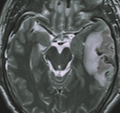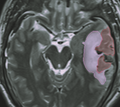Difference between revisions of "2012 Winter Project Week:UserInTheLoop InteractiveSegmn"
From NAMIC Wiki
Ivan.kolesov (talk | contribs) |
|||
| (5 intermediate revisions by 2 users not shown) | |||
| Line 4: | Line 4: | ||
Image:Slicer_KSlice_brain.png| | Image:Slicer_KSlice_brain.png| | ||
Image:KVoutSegTightMod.png| | Image:KVoutSegTightMod.png| | ||
| + | Image:TBI2.png| | ||
| + | Image:TBI1.png| | ||
</gallery> | </gallery> | ||
==Key Investigators== | ==Key Investigators== | ||
| − | * Peter Karasev, Ivan Kolesov:Georgia Institute of Technology | + | * Peter Karasev, Ivan Kolesov : Georgia Institute of Technology |
| − | * Karl Fritscher | + | * Karl Fritscher : BWH at Harvard and UMIT (Austria) |
* Allen Tannenbaum : Boston University | * Allen Tannenbaum : Boston University | ||
| Line 16: | Line 18: | ||
<h3>Objective</h3> | <h3>Objective</h3> | ||
*Goal: Improve the usability (speed, visualization, resource management) of the KSlice interactive segmentation algorithm. | *Goal: Improve the usability (speed, visualization, resource management) of the KSlice interactive segmentation algorithm. | ||
| − | |||
*Determine suggested energies to be used on different modalities/anatomic structures | *Determine suggested energies to be used on different modalities/anatomic structures | ||
| Line 26: | Line 27: | ||
<h3>Approach, Plan</h3> | <h3>Approach, Plan</h3> | ||
| − | * | + | *Test the algorithm on more data sets (so far, experiments on orthopedic MRI and limited CT datasets have been performed) |
| − | * | + | *Experiment different energies on different modalities. |
| − | * | + | *Reduce the memory consumption for multiple label maps. |
| + | *Allow new users (you!) to try the algorithm on your data sets (to obtain feedback on its usability). | ||
</div> | </div> | ||
| Line 35: | Line 37: | ||
<h3>Progress</h3> | <h3>Progress</h3> | ||
| − | + | *Successfully segment some TBI and AF images on first try. TBI works great, AF a bit less so due to the region-based nominal dynamics. | |
| + | *Profile with valgrind the bottlenecks in 3D application. | ||
| + | *Generate some synthetic 3D test data to best align matlab and c++ codes' testing. | ||
| + | *Video demo link: http://www.youtube.com/watch?v=gW675lEOByc | ||
</div> | </div> | ||
</div> | </div> | ||
Latest revision as of 16:31, 13 January 2012
Home < 2012 Winter Project Week:UserInTheLoop InteractiveSegmnKey Investigators
- Peter Karasev, Ivan Kolesov : Georgia Institute of Technology
- Karl Fritscher : BWH at Harvard and UMIT (Austria)
- Allen Tannenbaum : Boston University
Objective
- Goal: Improve the usability (speed, visualization, resource management) of the KSlice interactive segmentation algorithm.
- Determine suggested energies to be used on different modalities/anatomic structures
Approach, Plan
- Test the algorithm on more data sets (so far, experiments on orthopedic MRI and limited CT datasets have been performed)
- Experiment different energies on different modalities.
- Reduce the memory consumption for multiple label maps.
- Allow new users (you!) to try the algorithm on your data sets (to obtain feedback on its usability).
Progress
- Successfully segment some TBI and AF images on first try. TBI works great, AF a bit less so due to the region-based nominal dynamics.
- Profile with valgrind the bottlenecks in 3D application.
- Generate some synthetic 3D test data to best align matlab and c++ codes' testing.
- Video demo link: http://www.youtube.com/watch?v=gW675lEOByc
Delivery Mechanism
This work will be delivered to the NA-MIC Kit as a
- Slicer Module (via PLUS and OpenIGTLink)
References
I. Kolesov, P. Karasev, G. Muller, K. Chudy, J. Xerogeanes,A. Tannenbaum. Human supervisory control framework for interactive medical image segmentation.Proceedings of MICCAI Computational Biomechanics for Medicine Workshop, 2011.
P.Karasev, I.Kolesov, K.Chudy, G.Muller, J.Xerogeanes, A.Tannenbaum. Interactive MRI Segmentation with Controlled Active Vision. IEEE Conference on Decision and Control, 2011.




